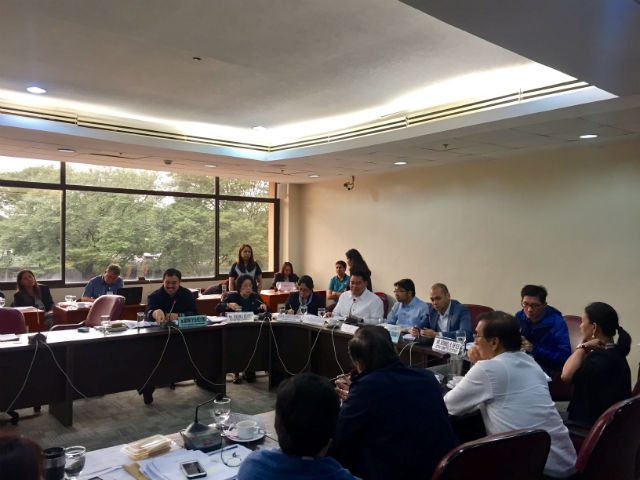SUMMARY
This is AI generated summarization, which may have errors. For context, always refer to the full article.

MANILA, Philippines – Several bills in the House of Representatives are seeking to establish a new Department of Culture (DOC), which would effectively replace the National Commission for Culture and the Arts (NCCA).
A joint House committee took up on Tuesday, August 14 House Bills (HB) 6113 and 6260, authored by Sorsogon 1st district representative Evelina Escudero and Pangasinan 4th district representative Christopher de Venecia. Both bills are known as the “Department of Culture Act of 2017.”
During the committee hearing, NCCA Plan and Policy Formulation and Programming Division Head Bernan Corpuz said the commission supported the passage of the bill as “culture is our soul, our identity, our heritage and this is what binds us as Filipinos no matter how diverse we are.”
The NCCA also said the creation of an independent body focusing on culture was essential to coordinating efforts and activities in “promoting national identity and culture and to mainstream culture in national development policy.”
Obstacles ahead: The proposed bills are being opposed by Buhay Representative Lito Atienza, who pushed that culture be lodged as a bureau under the Department of Education instead.
Atienza said this would be the more cost-effective approach and would also allow effects of cultural education to be felt among students “immediately.” He is the author of another bill in the House that seeks to revert the Department of Education (DepEd) back to its previous name as the “Department of Education, Culture, and Sport” to strengthen sports and cultural training programs.
De Vencia, however, said cultural education and training was just one aspect of the proposed bill. “I don’t think you can disregard all of the other proposed functions of the Department of Culture by simply just putting it within the banner of the department of education,” he said.
“One of the many benefits of putting a premium on arts and culture, at least for other countries, is that they’re able to leverage it for economic development and economic growth,” De Vencia added.
National Book Development Board Director Katarina Rodriguez also said the NCCA’s nature as an attached agency oftentimes leaves it overlooked, with mother agencies more familiar and concerned with their own issues.
Attaching it to DepEd, she said, will not change this.
“They still choose what to prioritize so culture will again be minor, marginalized, or placed in the sidelines. This is not the goal. The goal is to have equal recognition between education and culture,” she said.
Proposed powers: Under HB 6113 and 6260, the newly created DOC would be responsible for “the protection, preservation, regulation, development, management, dissemination, and promotion” of both tangible and intangible Philippine culture and arts.
It would also be responsible for crafting disaster risk reduction and management plans for culture and cultural properties, and would give the proposed department membership in the National Disaster Risk Reduction and Management Council.
Corpuz also suggested that the proposed department be allowed to “ensure the widest dissemination of the artistic and cultural products” to audiences both in the Philippines and overseas.
Key features: 6 bureaus will be created under the proposed department.
Among these are the Bureau of Cultural Communities and Traditional Arts Development, Bureau of Cultural Properties Protection and Regulation, Bureau of Cultural Properties Preservation, Bureau of Artistic Resources Development, Bureau of Cultural Research, Education, and Dissemination; and Bureau of Cultural and Creative Industries.
The bills will also create 3 national institutes for the following functions:
- National Institute of Living Traditions – to form programs to safeguard, sustain and propagate cultural heritage, particularly for indigenous communities;
- National Institute of Cultural Heritage Preservation – to form programs and projects in conservation arts, sciences, trades with focus on the preservation of cultural property and vocational training for the youth;
- National Institute of Culture and Arts Management – to form programs related to the education, training, and certification of cultural officers
The bills also seek to establish cultural centers and hubs to be known as “Sentro Rizal” in regions and overseas. It also proposes the creation of regional and overseas offices.
Apart from these, the Department of Culture would also have 12 attached agencies to harmonize cultural and artistic programs:
- Cultural Center of the Philippines (CCP)
- National Museum of the Philippines (NMP)
- National Historical Commission of the Philippines (NHCP)
- National Library of the Philippines (NLP)
- National Archives of the Philippines (NAP)
- Komisyon ng Wikang Filipino (KWF)
- Film Development Council of the Philippines (FDCP)
- National Book Development Board (NBDB)
- Design Center of the Philippines (DCP)
- Intramuros Administration (IA)
- National Parks and Development Committee (NPDC)
- Nayong Pilipino Foundation (NPF)
Corpuz noted the Department of Tourism wished to retain under its jurisdiction the IA, NPDC, and NPF after discussions. DCP would also remain attached to the Department of Trade and Industry.
Moving forward: No concrete decisions on the creation of the DOC were made during the hearing.
Lawmakers instead asked the Department of Budget and Management to submit a proposed cost for a new department and another one for new bureaus under the DepEd.
A counterpart measure for the creation of the DOC in the Senate is up for second reading. – Rappler.com
Add a comment
How does this make you feel?
There are no comments yet. Add your comment to start the conversation.